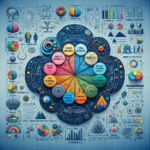—
**Theories of Intelligence in Relation to Cognitive Testing**
* **Cognitive Testing**: A method of assessing an individual’s mental functions and capabilities by measuring their ability to think, remember, learn, and solve problems.
—
Understanding the vast landscape of **Theories of Intelligence** is crucial for interpreting cognitive testing results. Intelligence is a complex construct, and multiple theories attempt to explain its facets, how it can be measured, and what it signifies about human cognitive functions.
* **Spearman’s Two-Factor Theory of Intelligence (g-factor)**: A classical model proposing that intelligence is composed of a general ability (g), which influences performance on all cognitive tasks, and specific abilities (s), which are task-dependent.
* **Multiple Intelligences Theory**: Introduced by Howard Gardner, this theory posits that intelligence is not a single general ability but a collection of independent intelligences, such as linguistic, logical-mathematical, musical, and spatial, among others.
* **Triarchic Theory of Intelligence**: Robert Sternberg’s framework breaks down intelligence into three components: analytical (problem-solving), creative, and practical (everyday skills) intelligence—each assessed differently in cognitive tests.
* **Emotional Intelligence (EI)**: This theory, popularized by Daniel Goleman, suggests that the ability to perceive, use, understand, and manage emotions is a form of intelligence that can affect personal success akin to cognitive abilities.
* **Fluid and Crystallized Intelligence**: Raymond Cattell’s theory differentiates between fluid intelligence (Gf), the capacity to reason and solve novel problems, and crystallized intelligence (Gc), the accumulated knowledge and skills from experience, both measurable through cognitive tests.
* **Piaget’s Theory of Cognitive Development**: Although not an intelligence theory per se, Piaget’s stages of cognitive development have implications for understanding how intelligence evolves through sensorimotor, preoperational, concrete operational, and formal operational stages.
—
By engaging with these **Theories of Intelligence**, researchers, psychologists, and educators can better design, interpret, and apply a range of cognitive tests aimed at capturing the diverse capabilities of the human mind. Whether for educational placement, psychological evaluation, or personal development, a nuanced appreciation of these theories enhances the understanding and utility of cognitive assessment tools.
—

